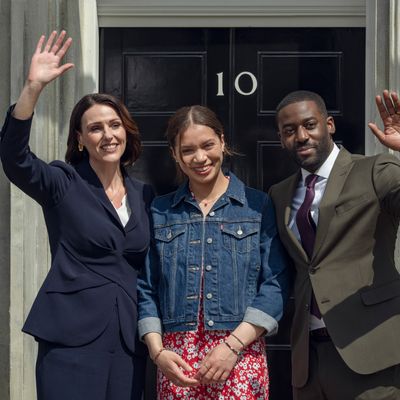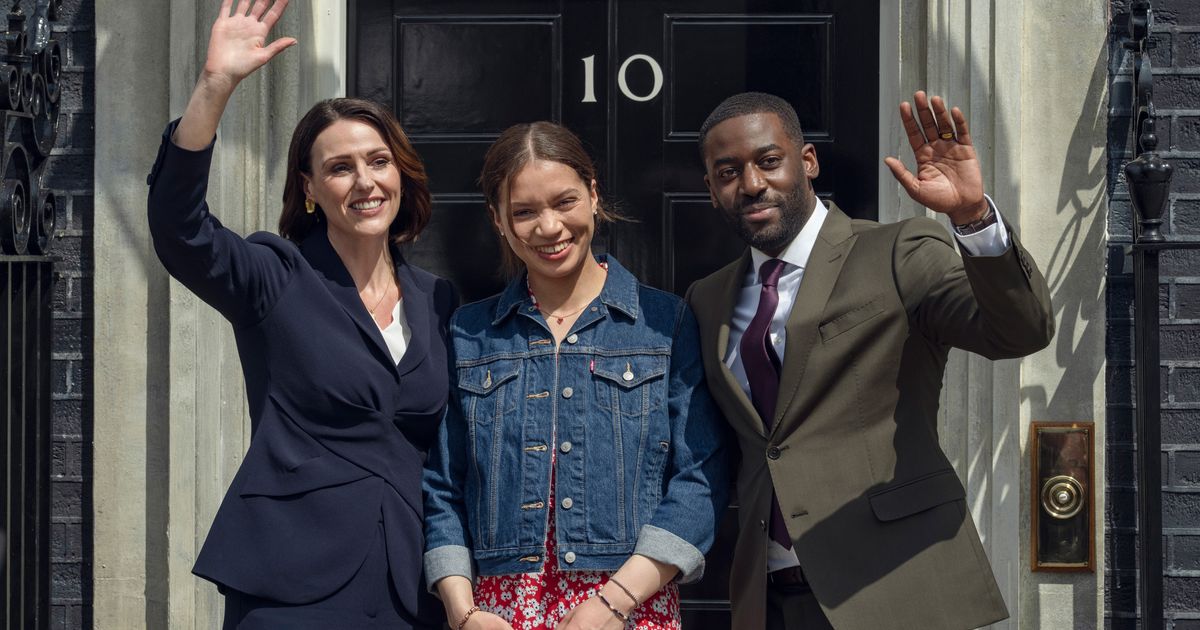
Episode 1
Season 1
Episode 1
Editor’s Rating
4 stars
****
Netflix latest political thriller follows a prime minister navigating a complex web of political and personal crises.
Photo: Des Willie/Netflix
There’s nothing quite like a ludicrous political thriller, is there? Questionable believability aside, they make for delicious TV: the suspense, conspiracies aplenty, the sense that you’re getting a peek behind the curtain at the inner workings of high political office, as contrived (and unrealistic) as it can all feel. Written by Matt Charman, best known for Bridge of Spies (he also wrote the entertainingly silly, Charlie Cox–starring political thriller Treason), Hostage is just the latest in the genre for Netflix, a market the streamer has increasingly cornered in the same way that Apple TV+ has made a play for Dad TV and cerebral sci-fi. Earlier this year, we had Zero Day, in which Robert De Niro played an ex-POTUS drafted in to deal with an unprecedented national crisis. The Diplomat, wherein Keri Russell portrays the U.S. ambassador to the U.K. — again, dealing with crises that stretch the bounds of plausibility — has become a go-to hit that is approaching its third season. Hell, I remember watching Designated Survivor, which wasn’t technically a Netflix show to begin with but eventually found a home on the streamer. Like peak House of Cards, these shows are easy to watch, and the stakes couldn’t be higher than Downing Street and the White House.
It’s established early on in Hostage that Abigail Dalton (Suranne Jones), the new prime minister — she’s just under a year into her tenure when the events of Hostage kick off properly — is both competent and relatively popular with the public, so that’s a first mark against realism. The crises she faces are both personal and political: On the one hand, a shortage of vital cancer drugs crippling the National Health Service has forced her to strike up a deal with the French president, Vivenne Toussaint, who is herself facing down the barrel of an election year. Before Sunrise royalty Julie Delpy plays Toussaint as steely and unrelentingly focused on the task at hand; she is a ruthless pragmatist who, regardless of her personal ideology, is happy to cozy up with the political right if it wins her points at home. (Soon into their summit, Dalton has to apologize for a hot-mic incident in which she called the French leader a “handmaiden to the alt-right,” a label that Toussaint describes as “liberal outrage.” A Marine Le Pen stand-in? Maybe, but plenty of centrists have shifted to the right IRL.) Even so, there are already enough obvious parallels to be drawn between them: They’re both women in a patriarchal profession; they both believe in public service; they would both prefer to hold onto power even if the consequences are profound.
Speaking of consequences: Dalton’s husband, Alex (Ashley Thomas), a Médecins Sans Frontières aid worker on a humanitarian mission in French Guiana, is kidnapped by armed militants. At first, their motivations are unclear; it eventually unfolds, toward the end of the episode, that they desire not a financial ransom but for Dalton to step down. In the prologue, we see Dalton and Alex before she has become party leader, let alone before an election has taken place, weighing the pros and cons of her mounting a leadership challenge. (At this point, it seems a foregone conclusion that her party would elect her and would win in the subsequent general election, such is her popularity with both her party and the electorate.) Dalton tells Alex that she doesn’t want anything to come between them, their relationship, or indeed affect their ability to raise their daughter together. That includes the pressure — and responsibility — of Downing Street. “If it ever comes down to a choice,” Alex says, “you’ll make the right one.”
It’s the line that most clearly summarizes the central conflict of Hostage: the tension between the personal and the political. Instinctively, most of us would prioritize the well-being of our families above everything else, but what if that was to the detriment of the country and its people that you lead? How do you make such a choice between the person that you love, who you have raised a child with, and your obligation to the millions of people who have entrusted you with leading an entire nation? It’s an interesting moral dilemma. At first, Dalton is defiant, taking on the “We don’t negotiate with terrorists” stance that you’d expect, though no doubt this will be tested as the pressure mounts and Alex comes under further threat. Besides which, Dalton doesn’t just have Alex’s life to think about — the captors have threatened to execute one hostage for every day that she refuses to resign. “Don’t resist the path,” Alex is forced to tell her at gunpoint.
Conveniently for the drama at hand, Alex has been kidnapped in French territory, which necessitates French support in the rescue effort. Toussaint is outwardly sympathetic but is also hardly naïve to the negotiating advantage this offers her. After all, the stakes of the summit couldn’t be higher for her political survival. The French election is weeks away, and returning with a favorable deal — including the deployment of French troops on British soil to police the border along the English Channel, a populist projection of strength for the conservative electorate that Toussaint wants to court amid the migrant crisis — is essential. Through dialogue with Toussaint’s liberal stepson, Matheo (Corey Mylchreest), we also discover that her husband is a French news baron who has been encouraging her to shift toward the political right to bolster her reelection chances. Basically, she’ll do whatever is necessary to achieve her goals at the summit — and that includes double-crossing Dalton at a news conference, minutes after she has been told about Alex’s predicament in French Guiana. Very, very cold.
Nonetheless, Toussaint pledges French support in the rescue effort. (Which we’re shown is leaked to the captors. Who’s the mole?) Speaking to one another at a reception that evening, we get a humanizing moment for them both: Dalton confides in Toussaint the isolation that she feels as a world leader despite the fact that she is literally never alone; Toussaint jokes that “compulsive masturbation” is her go-to hobby, which she quickly dials down to online poker. Suddenly, everyone is called back to the situation room; an MI6 agent has tracked down the hostages, and a French rescue helicopter is minutes away. If we weren’t watching a political thriller–cum-melodrama, it might all be over here. But no! There’s obviously another twist in the tale: Toussaint is hit with a video over text that reveals, gasp, she had an affair with Matheo. With her political livelihood on the line, she calls off the rescue, to Dalton’s shock and dismay. “Tell her you’re gonna have to resign,” Toussaint says of Dalton’s daughter, Sylvie (Isobel Akuwudike). “It’s the only way to get him back.” Cowardly? Yes. But once again: ice, ice cold.
• Is Toussaint over her affair with Matheo? That she is so cold with his new girlfriend, Saskia (Sophie Robertson), would suggest not. Though it does afford Toussaint the opportunity to get in a less-than-subtle dig: “I usually have a briefing memo put together for Matheo’s plus ones.”
• Dalton hiding the crisis from almost everyone — including her hospitalized father (James Cosmo) — seems like it will come back to haunt her. But would you do anything differently? When the stakes are so high, who can you trust?
• Why the hell would Toussaint and Matheo make such an incriminating video, anyway, let alone keep it? Did they not stop to think, “Hey, there’s a chance that an unencrypted phone might be hacked at some point, and the video might be stolen?” Maybe such trivial concerns are forgotten in the heat of passion, but come on. The age gap would be enough of a scandal, let alone the fact that he is literally her stepson. Whatever the case, it is incredibly stupid.
VULTURE NEWSLETTER
Keep up with all the drama of your favorite shows!
Vox Media, LLC Terms and Privacy Notice

